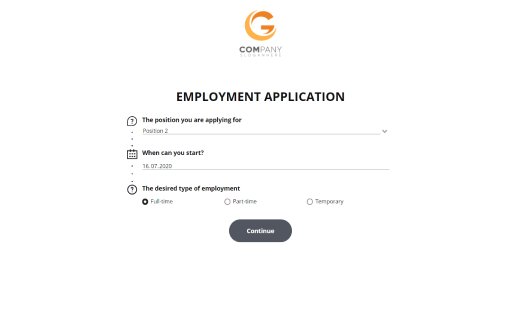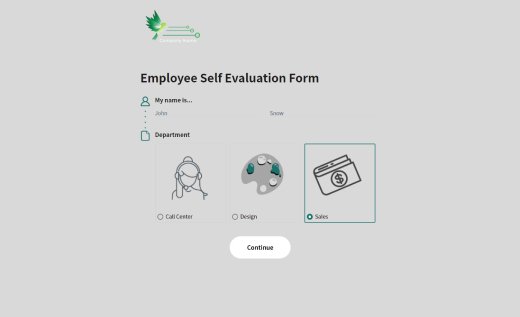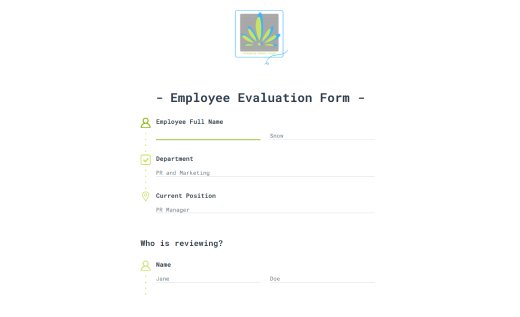Employee Satisfaction Survey Template
Learning about your employee’s satisfaction and engagement is a game-changing idea. Our feedback tool will reveal the state of affairs in your company and allow you to find out why people quit, reduce staff turnover, increase employee efficiency, find new ways to motivate, and build a sophisticated company culture.
In fact, compensation is not a crucial factor for three-quarters of employees! Want to know what else matters? Ask your staff anonymously using this employee satisfaction survey sample. We have enriched it with interactive ratings, scales, and sliders to make it engaging for applicants. Get this ready-to-use employee feedback template that you can customize in five minutes with the handy AidaForm builder! Also, scroll down to dozens of questions covering all aspects of the workflow.
HR Forms to Complement Your Employee Feedback Survey
Employee Satisfaction Survey Questions
How to Keep the Survey Anonymous
Solid confidentiality lets people voice their honest opinions. Ask for no names or personal details. Information about the department and period of employment can be useful to review the results; however, you might want to make these fields optional for an employee’s peace of mind. Include the Date of Survey field to monitor results from year to year.
- What is your Department/Team?
- How long have you worked for the company?
- Are you a new employee?
How to Measure Overall Employee Satisfaction
Start your employee satisfaction questionnaire with this unit. Young specialists gravitate towards work-life balance. This metric will display if you are on the right path towards fulfilling your employees’ needs.
- Are you happy working for the company?
- Are you satisfied with your job responsibilities?
- What exact emotions do you feel while working?
- How often do you feel stressed at work?
- Do you feel appreciated?
- Does the work give you a feeling of self-realization?
- Are you considering job opportunities outside the company? Why?
How to Improve Working Conditions
There are always things to improve. Making working conditions more comfortable may increase performance levels significantly. Find out why your staff like or dislike working for the company.
- How do you rate the working conditions and the environment?
- What would you add to or improve about your work routine?
- What would make your work routine more comfortable?
- Do you have all the necessary tools/resources/devices? State what you need.
- Are your fellow team members supportive?
- How do you assess your time-off and vacation periods?
- How often are you obliged to stay late at work? Is this paid fairly?
- Do you feel safe at your workplace?
How To Compensate Fairly
Although it is not all about the salary, we still cannot skip this side of work. It’s crucial to pay people what they are worth in line with the local market. If you are ready to expand your compensation package, research what people are looking for as satisfying benefits:
- Does your salary meet the level of thelocal market?
- Is your work compensated fairly?
- Are you satisfied with the compensation package in general including sickness benefits and life/health insurance?
- Assess your paid vacation plan as satisfying or not satisfying.
- Assess your retirement plan and retirement company’s offering.
- How would you like us to expand the compensation package?
- What types of bonuses are preferable for you?
- Does the company give you financial advice?
How to Implement Career Growth
Instead of just expecting people to grow, give them real opportunities to develop professionally. Make sure you provide enough space for promotion within the company. Skills training is also a great tool to motivate and empower those employees who are keen on professional development.
- Do you have enough room to advance?
- Are you able to use your skills to their full potential?
- Are you aware of the possible paths towards promotion within the company?
- Are you satisfied with your last appraisal?
- Are you satisfied with your advancement prospects?
- Does the company support your career growth?
- Do you have enough resources to develop your skills?
- Is there any training you think would be necessary for you to grow?
How to Cut Vertical Barriers
These questions may sound compromising, but boss-subordinate relationships should be monitored in the best way. By asking your staff directly about management style, you can correct the leadership policy and guide your managers.
- Can you freely get along with your manager?
- Are you able to speak openly to the CEO?
- How can you assess your supervisor’s job?
- Evaluate the effectiveness of the company’s management.
- Is your supervisor always able to address your questions and issues?
- How frequently do you get feedback from your manager/supervisor?
- Are the feedback and performance reviews that are given fair?
- How seriously does the supervisor take your own feedback/opinions?
- Do you receive recognition of your achievements and efforts?
- Does your manager take into consideration your family responsibilities?
How to Weight the Reputation of Your Company
Do your employees appreciate the company’s mission? What do they actually think about your attitude to the staff and are they ready to recommend your company as a sustainable workplace? See, your employees reflect your brand values. This is especially relevant for service-oriented organizations such as banks, hospitals, restaurants, and hotels. Find out how to enhance your company’s culture and cultivate people’s loyalty.
- Do you understand the company’s mission and purpose? Does it inspire you?
- Do you share the company’s values?
- Are you proud to be a part of this company?
- What do you like/dislike about the corporate culture?
- What would you change about the company’s culture and attitude?
- What do you like the most about the company?
- What do you dislike about working for the company?
- Would you recommend the company as a good place to work?


